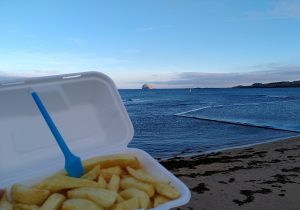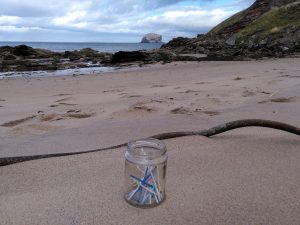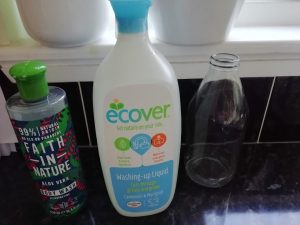
Scotland bans single-use plastic cutlery
In a positive move for wildlife, November saw legislation laid in the Scottish Parliament to ban single-use plastic cutlery and plates. The same month also saw the Marine Conservation Society publish the results of its annual Great British Beach Clean for 2021 with some significant drops in once common plastic litter items like cotton buds.
Scotland bans single-use plastic cutlery and plates
Often seen in litter on our beaches and in the wider environment, the ban on single-use plastic cutlery and plates in Scotland is due to come into effect in June 2022. This is a welcome move from the Scottish administration, making it the first of the UK nations to put a ban into law. A consultation has taken place in Wales[1], and consultations are current in England[2] and Northern Ireland[3]. Fidra responded to the Scottish consultation[4] and welcomes the quick move to lay the legislation. The items that will be covered are plastic cutlery, plates, straws, beverage stirrers and balloon sticks, as well as expanded polystyrene food containers and cups. Plastic straws will be exempt if needed for independent living or medical reasons.

Plastic cotton buds in beach litter are down
Cotton buds are down
This year’s Great British Beach Clean results saw plastic cotton bud sticks finally move out of the UK’s top ten most common rubbish items, with the lowest average of 6 per 100 m in the event’s 28-year history[5].
Almost certainly this is a direct result of major manufacturers and retailers in the UK switching to alternatives such as rolled paper, and Scotland’s ban on their sale laid in 2019[6]. After Fidra’s efforts on the Cotton Bud Project, working with manufacturers, retailers and the government to end plastic cotton buds pollution, it is great to see numbers come down[7]. The success of the Cotton Bud Project was closely linked to the data collected by the Marine Conservation Society’s volunteers, showing the invaluable contribution citizen science can make to the health of our planet.
A similar good result is evident due to the plastic bag charge which has been in effect since 2014[8]. Numbers found on the Great British Beach Clean dropped almost immediately and in 2021 the average number of plastic carrier bags recorded for every 100 m of beach was 3, compared to a high of 13 in 2013.
Next steps
The ban on plastic cotton buds and the plastic bag charge have both served as positive examples of the effect of bans and levies on litter. Now that we know that works, what’s next? There are numerous single use plastic items that are littered and could be addressed, from wet wipes to condiment sachets, with countries around the globe varying their approach[9]. However there is a risk that such actions to address plastic in litter can lead to unintended consequences if other factors are not considered such as the availability of alternatives and our overall levels of consumption, not just of plastic products.

Refill packaging and containers
Reuse revolution?
The increasing levels of consumerism in our modern society is leading to over-use of our resources[10], which are then lost almost immediately if items are just used for a single time[11]. Plastic production is also a significant contributor to global greenhouse gas emissions and climate change[12]. There is a logic that non-essential single-use items should be banned no matter what material they are made of. Certainly where single use is unavoidable the materials being used should be practically recyclable with the appropriate supporting infrastructure. In addition, there should be a concerted movement towards reuse and refill systems as much as possible, to prevent unnecessary resource loss. There are numerous examples that have been shown to work, from reusable cups[13] to refill systems[14], and we can often look back to history for inspiration[15].
From cotton buds to cutlery, the Scottish public are leading the way with their enthusiasm for further action, commitment to beach cleans, and support for legislation. We now need the government to continue to be ambitious and follow and build on this support. It needs to continue addressing the problem of single-use plastics not only through increasing the removal of them from our lives but also supporting the development of viable alternatives that won’t have unintended consequences.
References
[1] https://gov.wales/sites/default/files/consultations/2020-07/reducing-single-use-plastics-consultation.pdf
[2] https://consult.defra.gov.uk/environmental-quality/consultation-on-proposals-to-ban-commonly-littered/
[3] https://consultations2.nidirect.gov.uk/daera/linea-ni-consultation-on-single-use-plastics-bever/
[4] Fidra consultation response: https://www.fidra.org.uk/wp-content/uploads/Fidra-ScotGov-SUP-consultation-response-Jan-2021.pdf
[5] https://www.mcsuk.org/what-you-can-do/join-a-beach-clean/great-british-beach-clean/great-british-beach-clean-2021-results/
[6] https://www.legislation.gov.uk/ssi/2019/271/made
[7] https://www.cottonbudproject.org.uk/
[8] https://www.legislation.gov.uk/sdsi/2014/9780111023211
[9] E.g. https://www.gov.ie/en/publication/4221c-waste-action-plan-for-a-circular-economy/
[10] https://www.resourcepanel.org/reports/global-resources-outlook
[11] https://www.zerowastescotland.org.uk/research-evaluation/material-flow-accounts-mfa
[12] https://www.ciel.org/plasticandclimate/
[13] https://www.recircle.ch/en/
[14] https://therefillery.co.uk/
[15] https://www.healthing.ca/wellness/health-history-how-cotton-swabs-went-from-baby-gays-to-q-tips/
